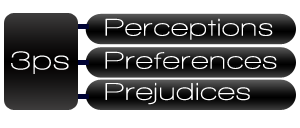Race and Your Resume Part 2 – “The Three Ps”
We began to delve into this important issue in the post last week, and you can access it below this post. We took a look at your most important job hunting tool and how you might want to “frame” yourself in your quest for a job. This post will look at the forces that make a difference during the job search.
The Ever-present 3Ps (Racial Perceptions, Racial Preferences, and Racial Prejudices) and Your Job Search!
These three influences define the environment for all sales professionals, and even more so for Black sales professionals as it represents the theater that must succeed in before getting gainful employment.
During the job search, everything revolves around your ability to get an interview. Your job search can be difficult, made so by the large number of candidates that are applying and the fact that the resume reviewers (whether hiring managers or human resource professionals) have to make some quick decisions about who makes it to the next level because of the volume of applicants. In the last post we called the categories the A, B, C, & D (Discard) stacks, which is relevant whether it is paper or electronic applications through and applicant management system.
I call these imposing factors The 3Ps: Racial Perceptions, Racial Preferences, and Racial Prejudices! They make a sales job difficult. Knowledge of them will serve you well. Success and the reduction of frustration in your job hunt is dependent on an understanding these.
The 3Ps can have an effect, and sometimes an insidious effect, on the hiring process. It can happen without the perpetrator even really thinking about it.
A brief definition of the 3Ps is as follows:
Racial Perceptions – are hard to change, and deep rooted. They can come from many sources. A person’s life experiences, the media, parents, friends, and the knowledge and ignorance of interaction or lack of interaction all form perceptions. Perceptions are prevalent in all racial and ethnic groups. We all have them; it is what we do with them that make all of the difference.
Racial Preferences – These are powerful. They are not always meant to be deleterious to a particular racial group, yet have that effect when they are applied as the opportunity for fairness and equity can be missed. The hiring manager’s desire of whom they want to work with may be directly related to their personal relationship comfort. Some preference may come from perceptions, and some from prejudice, but the net result is the same: The sales professional who is capable may not be interviewed because they don’t quickly meet the preference of the selector. Often it is because of a reluctance to do business with someone who is decidedly different than they are. It is no difference for any professional. Do you have any preferences? I will bet you do!
Racial Prejudice - renders any hiring situation difficult, if not impossible. Racial prejudice does change the landscape. You probably won’t change this attitude as you can do with racial perceptions and racial preference, and you may be able to spend your time better elsewhere. If a buyer is prejudiced, the narrow-mindedness and patent unfairness will reduce, or destroy your chances of having a successful employment relationship, or keep it very short lived.
Back to These Stacks of Resumes as Discussed in Part I
Now, the simple fact is that any one of the 3Ps can change which stack your resume ends up in. So at the risk of sounding over simplistic when it is to your advantage you should willingly disclose your race. When you are in doubt, you should give consideration to ‘scrubbing’ your resume of racial indicators. An employer will very possibly not be checking “LinkedIn” in the first stages, as there are too many candidates.
There are some points that you should note about resumes whether in stacks, or filed electronically in Applicant Management Systems that are important. You can be the beneficiary in either of the following situations:
- Many organizations have matured to the point that professional HR representatives do the things necessary to assure that there is diversity in the candidate pool. They are your assets in this situation.
- Many employers purposely attempt to correct deficiencies in their workforce and sales force diversity with proactive hiring procedures in which they look for qualified minority candidates.
Make your resume the “teaser” that it should be. It will get you past the door, and into the mix. Most larger or more sophisticated organizations have human resource professionals who help to assure fairness.
Consider the next couple of points as a suggestion:
- Include a tastefully done “head and shoulder” shot in your LinkedIn profile. No screen shots form your computer, pay a few dollars if you don’t have one already.
- Be judicious in your inclusion of information, but you may not need to “scrub” your resume.
- Include positions of leadership for social organizations, but you might consider avoiding any controversial ones. Include activities that have a leadership or business angle. All else is just information.
My Personal Opinion
I think that you might already have a good idea that I have confidence in HR professionals. For the most part they are serious minded about inclusion, diversity, and fairness in the process. Often in the hiring process they are the “neck that turns the head” for the manager so the process does work. They present diverse candidate pools and do their best to “watch” the process.
I believe that many managers have some preferences because they are human. They constantly need to “true-up” these preferences with requisite fairness. When you exercise preferences and don’t balance it with fairness, you discriminate. Exercising Racial Preference is discrimination. Fairness and equity is what managment should be striving for.
As managers we have to avoid thinking of stereotypical sales professionals and sales personalities. We need to be open to interviewing candidates of all races and backgrounds. In the end, the decision on a candidate in good organizations is a decision process that includes HR, a hiring manager, and at the very least, that hiring manager’s manager.
Let me know what you think write me at Michael.parker@BlackSalesJournal.com.
 July 9, 2015
|
Posted by Admin9!
July 9, 2015
|
Posted by Admin9!


 Categories:
Categories:  Tags:
Tags: 

Your Comments